Brain Food
Written by Akansha Wankhede & Natasja Azad
Graphics by Nimisha More & Divya Sharma
Share this article
Brain aging | Key nutrients for optimal brain function | Brain foods-Supplement vs. Natural source | Can we grow new brain cells- Neurogenesis & Synaptogenesis | SECRET HERBS | Alternative to coffee?! | BONUS | Takeaways
Have you zoned out amidst a critical lecture or failed to concentrate while the patient described their history? Did you ever feel the need to have a superpower to not feel drowsy all the time and efficiently tasking things? Have you been overburdened by deadlines that your brain wasn’t able to streamline thoughts?
As Physical Therapists, we need to have high visual and auditory processing for articulating thoughts and formulating a correct diagnosis.
Simply put, our brain always needs a little bit of pampering. And we have collated a list of nutrients and herbs that do just that.
We would also highly recommend a Neuro Physiotherapist to scan through this article and make that small informed decision in alliance with the correct professional to create a difference in your patient’s disease progression.
Key Nutrients For Optimal Brain Health:
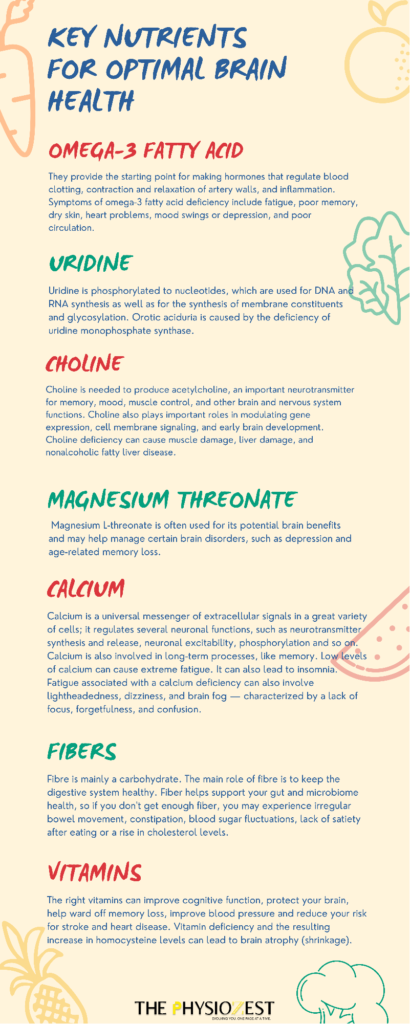
Deficiency of:
| Omega-3 Fatty Acids | 1. Problems with skin, hair, and nails 2. Fatigue and trouble sleeping 3. Deficits in concentration 4. Joint pain and leg cramps 5. Cardiac conditions 6. Mood swings or depression 7. Poor circulation. |
| Choline | 1. Cardiovascular disease 2. Neurological conditions, such as Alzheimer’s disease 3. Nonalcoholic fatty liver disease 4. Neural tube irregularities 5. Muscle damage |
| Magnesium | 1. Fatigue 2. Muscle spasms, stiffness or weakness 3. Loss of appetite 4. Nausea |
| Calcium | 1. Confusion or memory loss. 2. Muscle spasms. 3. Numbness and tingling in the hands, feet, and face. 4. Depression. 5. Hallucinations. 6. Muscle cramps. 7. Weak and brittle nails. 8. Easy fracturing of the bones. |
| Vitamins | A. Vitamin B12 1. Confusion or memory loss. 2. Muscle spasms. 3. Numbness and tingling in the hands, feet, and face. 4. Depression. 5. Hallucinations. 6. Muscle cramps. 7. Weak and brittle nails. 8. Easy fracturing of the bones. B. Vitamin B1 1. Loss of Appetite 2. Fatigue 3. Irritability 4. Reduced Reflexes 5. Tingling Sensation in Arms and Legs 6. Muscle Weakness 7. Blurry Vision 8. Nausea and Vomiting. 9. Shortness of breath 10. Change in heart rate C. Vitamin B9 1. Tiredness. 2. Weakness. 3. Heart palpitations. 4. Shortness of breath. 5. Headaches. 6. Irritability. 7. Difficulty concentrating D. Vitamin D 1. Fatigue and tiredness 2. Bone and back pain 3. Impaired wound healing 4. Bone loss 5. Muscle pain. E. Vitamin E 1. Muscle weakness 2. Coordination and walking difficulties 3. Numbness and tingling: 4. Vision deterioration 5. Immune system problems |
| Fibers | 1. Constipation/bloating. 2. Hunger after meals. 3. Blood sugar fluctuations. 4. High cholesterol. 5. Fatigue/low energy. 6. Inflammation. |
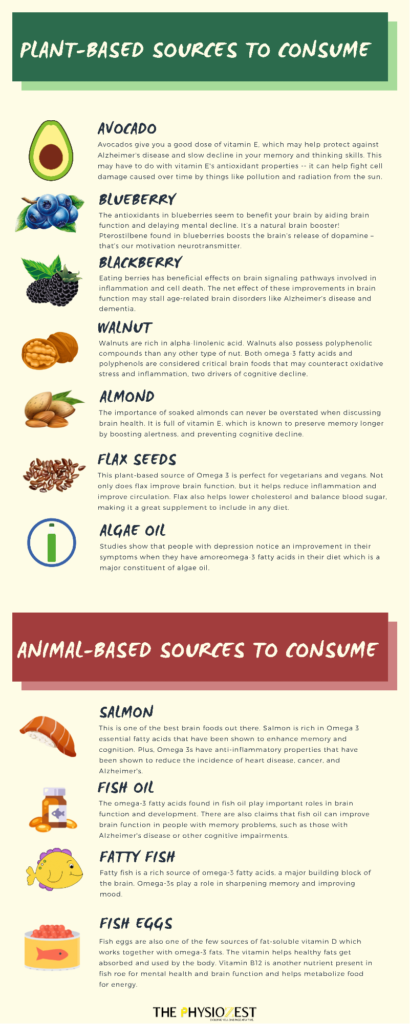
Tip Corner– Brain imaging studies have shown that people who consume 4gms of Omega-3 fatty acids daily have a 75% decreased risk of Dementia and Alzheimer’s than those who consume < than 2gms.
Can supplements replace a healthy diet?
Supplements are not as biologically active as vegetables and fruits. Isoforms are essential- If you supplement yourself with Vitamin E, you get one form of vitamin E, but if you have hazelnuts, almonds, or flax seeds, you get – all eight different states. One form boosts oxygenation, which is good for your brain; another form has an absorptive function.
Can food and herbs promote Neurogenesis and Synaptogenesis in Adults?
Neurogenesis is the process by which new neurons are formed in the brain. Synaptogenesis is the formation of synapses between neurons in the nervous system. Studies have shown that neurogenesis in mammalian adults occurs in the hippocampus and amygdala.
Neurogenesis in adult brains is induced by physical exercise, dietary components such as PUFAs and polyphenols, caloric restrictions, and the process of learning.
Neurogenesis being a debatable topic, we recommend the reader to gain more insight through this article- Kumar, Ashutosh et al. “ADULT NEUROGENESIS IN HUMANS: A Review of Basic Concepts, History, Current Research, and Clinical Implications.” Innovations in clinical neuroscience vol. 16,5-6 (2019): 30-37.
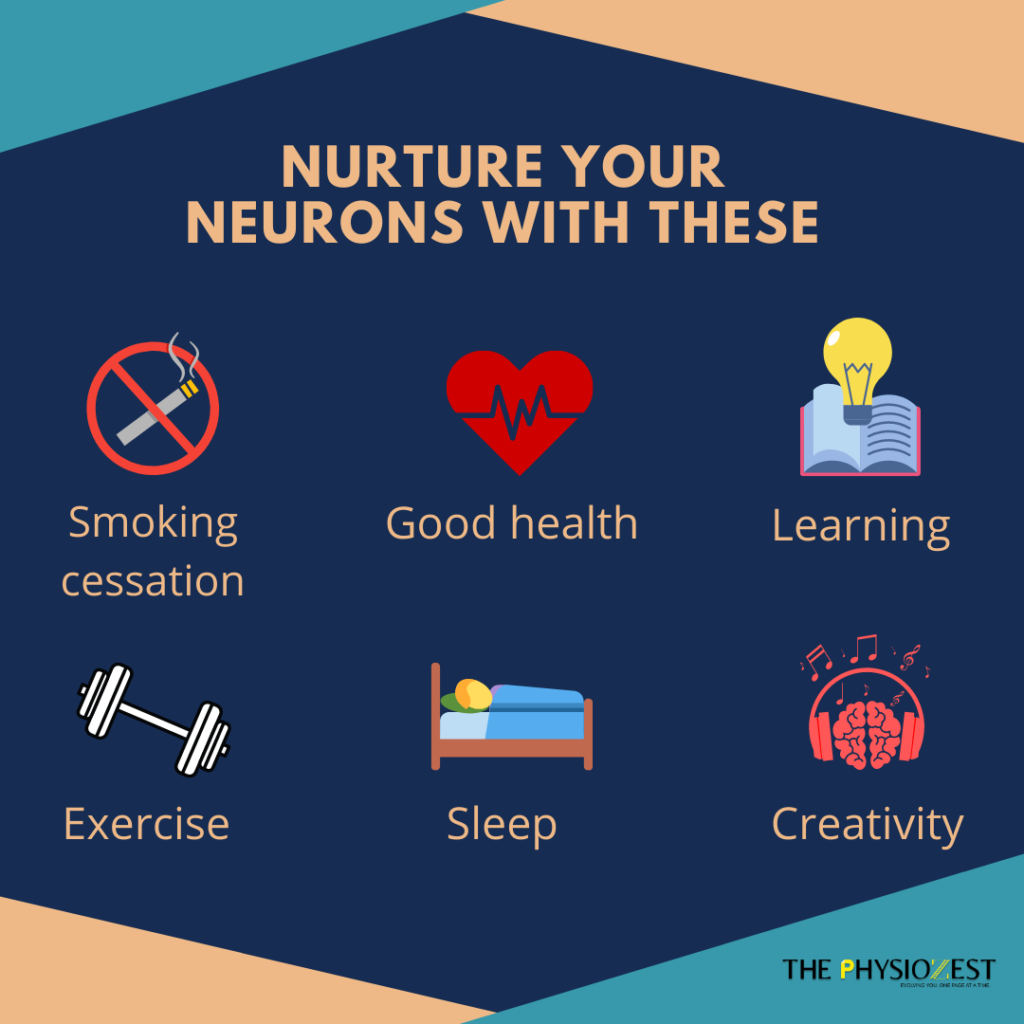
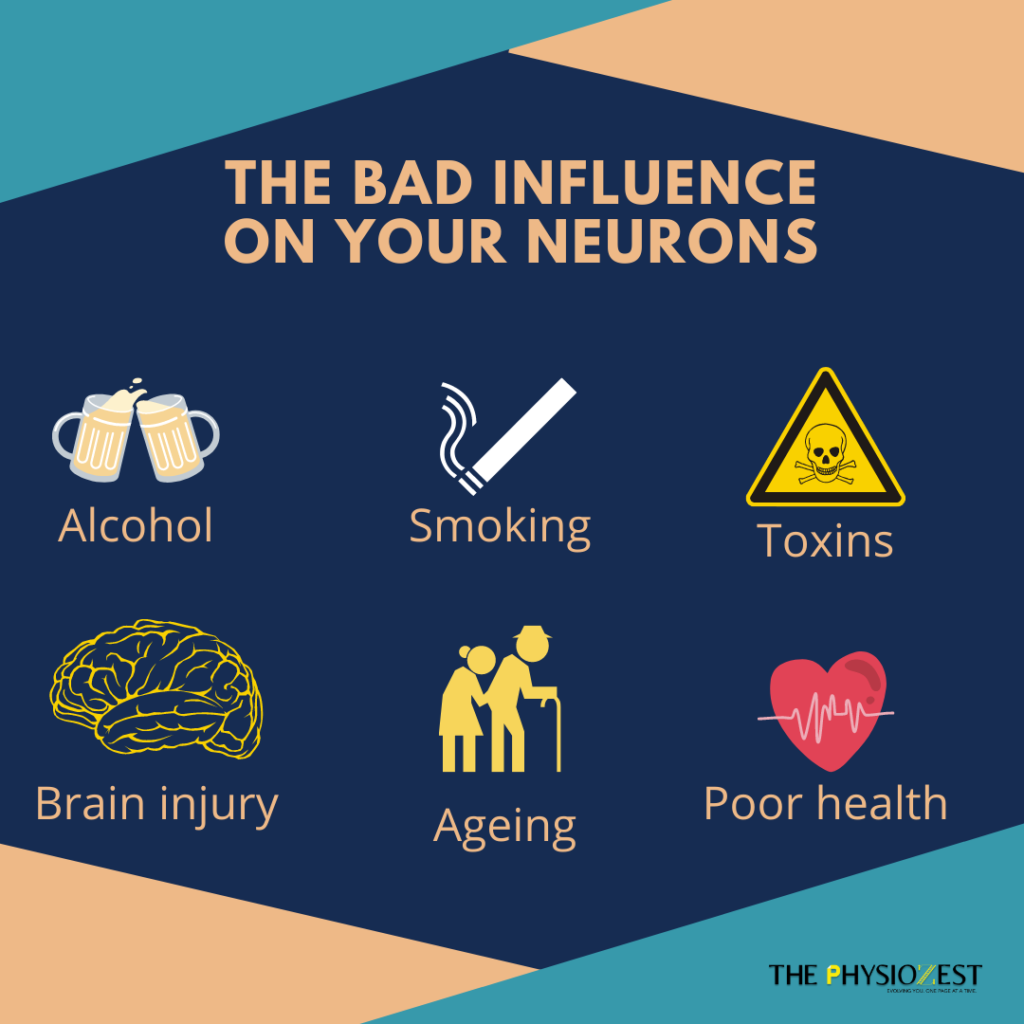
Adult neurogenesis is known to occur in three regions in the mammalian brain:
the subgrade, annular zone (SGZ) of the dentate gyrus in the hippocampus, which is a region that is involved in regulating learning and memory
the subventricular zone (SVZ), situated throughout the lateral walls of the brain’s lateral ventricles, the amygdala.
Five herbs that are scientifically proven to improve brain function and dynamics.
- Bacopa monnieri- Bramhi
- Gotu kola
- Ginseng
- Gingko Biloba
- Sage
1. Bacopa monnieri
Brahmi- Herb of Grace
Our Ancient scholar’s secretive herbal remedy to enhance brain function is known to be Brahmi. Bacopa monnieri has been used as Ayurvedic medicine to treat Neurodegenerative disorders for ages.
Benefits
1. Boosts memory, attention, learning rate, and speed of processing visual information.
2. It prevents anxiety and stress.
3. Bacopa monnieri is considered to be safe but shows side effects in some individuals.
Research HUB
1. A study showed that treating rats with dementia with Bacopa monnieri reduced free radical damage and reversed signs of memory impairment.
2. One study in mice showed that it increased dendritic length and branching. Dendrites are parts of nerve cells in the brain that are closely linked to learning and memory.
3. Additionally, a 12-week study in 46 healthy adults observed that taking 300 mg of Bacopa monnieri daily significantly improved the speed of visual processing information, learning rate, and memory compared to placebo treatment.
2. Ginkgo Biloba- The living fossil
Ginkgo biloba, the living fossil from China, has been used to enhance brain function and mental well-being.
Benefits:
1. Ginkgo seeds and leaves are used as Chinese herbal medicine and it’s an extract in modern treatment.
2. It contains powerful antioxidants, fights inflammation, reduces psychiatric disorders and dementia symptoms, and can reduce anxiety and depression.
3. A review of 21 studies revealed that ginkgo extract might increase functional capabilities in those with mild Alzheimer’s when used in conjunction with conventional medicine.
3. Gotu Kola- Herb of Longevity
1. Gotu kola is an ancient Chinese and Ayurvedic medicinal herb.
2. It can enhance memory and nerve function, which gives it potential in treating Alzheimer’s disease.
3. It may also help in reducing anxiety, insomnia, and stress
4. One 2012 study on mice found that Gotu kola extracts positively affected behavioral abnormalities in Alzheimer’s disease.
4. Ginseng
Ginseng is herbal medicine in Ayurveda. It has been shown to benefit mental functions, calmness, and mood in healthy people and those with Alzheimer’s disease.
Ginseng may help fight behavioral and enhance physical activity by lowering oxidative damage and increasing energy production in cells.
It can be consumed both raw or added to your tea.
Research hub
One four-week study explored the effects of giving 1 or 2 grams of Panax ginseng or a placebo to 90 people with chronic fatigue. That given, Panax ginseng experienced less physical and mental fatigue and reductions in oxidative stress than those taking the placebo.
5. Sage
Sage is a herb with a long history of medicinal properties. Studies show that sage may improve memory, brain function, and symptoms of Alzheimer’s disease. It also appears to halt the chemical messenger acetylcholine (ACH) breakdown, which has a role in memory. ACH levels seem to fall in Alzheimer’s disease.
Research showed that this Jie taking the sage extract performed better on tests that measured memory, problem-solving, reasoning, and other cognitive abilities.
In healthy adults, sage was shown to improve memory in low doses. Higher doses also elevated mood and increased alertness, calmness, and contentedness.
Bottom line – Herbs are considered safe, but there are associated risks with any herbal supplement. Kindly consult an Ayurvedic practitioner, BAMS (Bachelor of Ayurvedic Medicine And Surgery) degree before consumption.
Bonus – Tips & Tricks
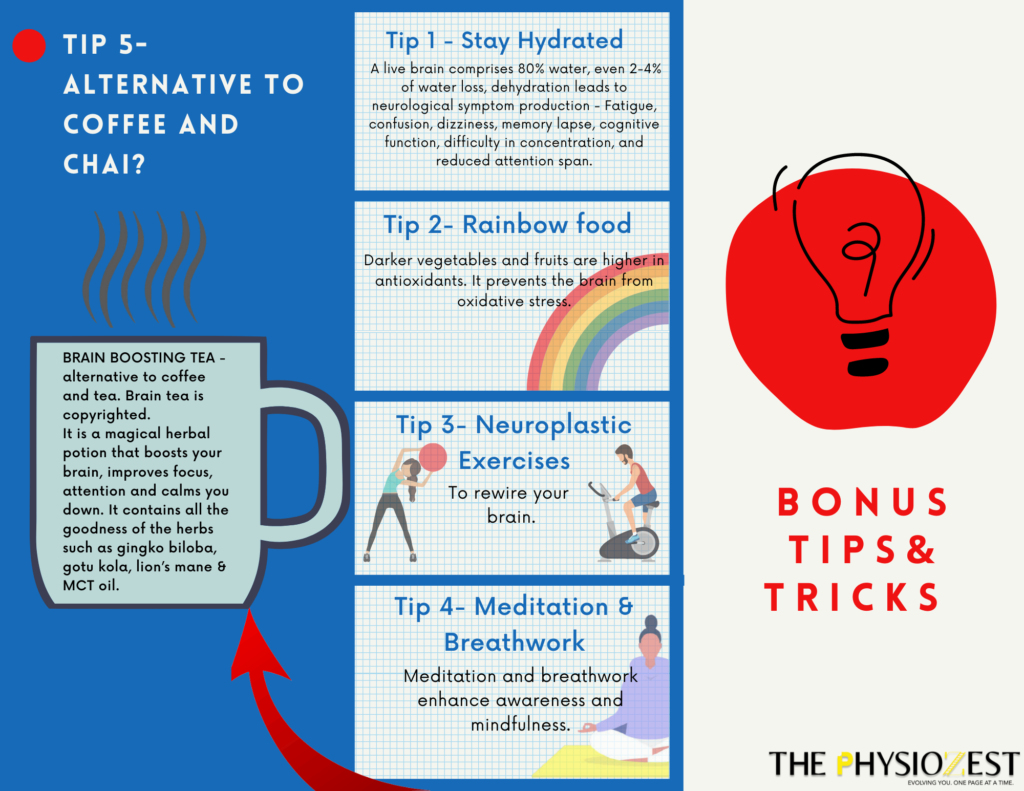
Remember – What you eat matters for your grey matter
1. Practice mindfulness and awareness.
2. Evolve yourself physically, mentally, emotionally, and spiritually by targeting intrinsic as well as extrinsic factors.
Your brain works tirelessly; why don’t you give it some love? All it takes is enough sleep, exercise, and BRAIN FOOD.
Takeaways
- Brain dynamics consists of practicing, training and providing the right amount of nutrition for the optimal functioning of our brain.
- The deficit in patterns of sleeping, physical activity, and nutrition deficiency can cause ‘ BRAIN FOG’ and mild neurological impairments.
- Nutrition plays a key role in optimal functioning as the blood-brain barrier allows the passage of essential nutrients for our brain.
- Adult neurogenesis and synaptogenesis along with natural brain food intakes can improve your cerebral functions and outcomes. It will improve your quality of life.
- Ancient Ayurvedic herbs and Chinese herbs are age-old remedies when consulted and consumed under guidance, it can improve your mental functions.
- A small conscious step can change your brain dynamics and outcome.
- Remember, what you eat matters for your grey matter
Contributors

AKANSHA WANKHEDE
Research & Content Writing Team

NATASJA AZAD
Content Writing Team

DIVYA SHARMA
Multimedia Team

NIMISHA MORE
Multimedia Team
